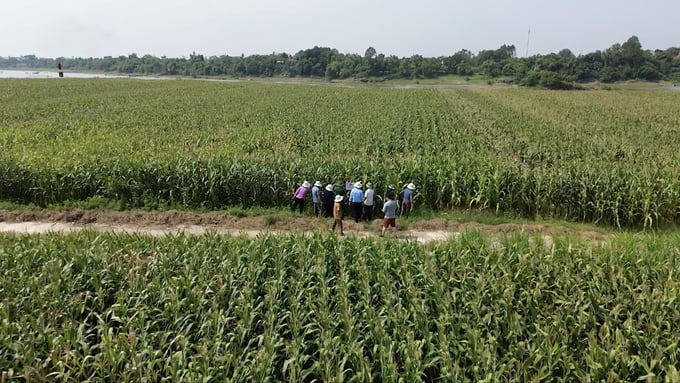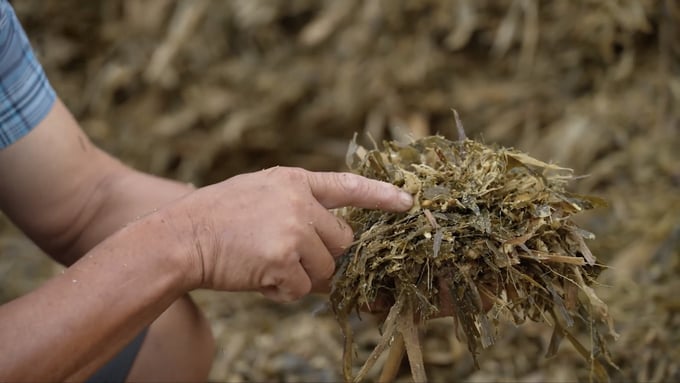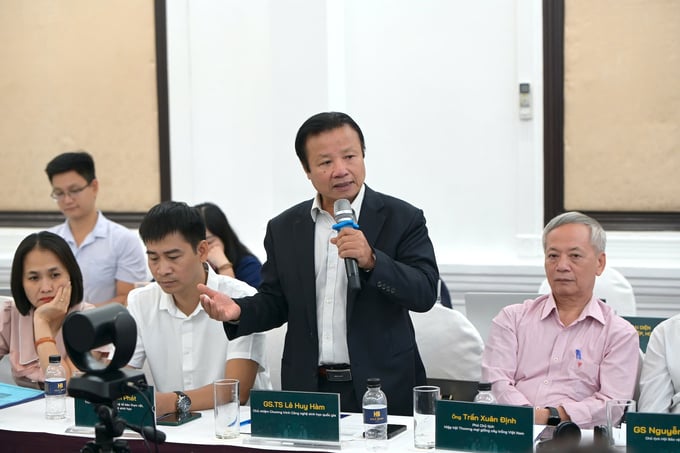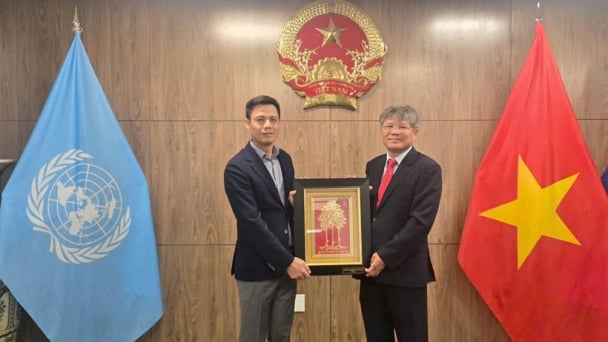May 21, 2025 | 16:50 GMT +7
May 21, 2025 | 16:50 GMT +7
Hotline: 0913.378.918
May 21, 2025 | 16:50 GMT +7
Hotline: 0913.378.918

Genetically modified corn, resistant to pests and cold weather, is cultivated by Son La farmers as feed for dairy cows. Photo: Hung Khang.
For decades, every morning for Mr. Ngo Van Tung, a dairy farmer in the Sao Do 1 Sub-area (Van Ho Commune, Van Ho District, Son La), begins bright and early. His herd currently numbers around 100 cows, so taking care of them and milking them has become an essential part of his routine.
“All the cows are milked twice a day, once in the morning and once in the afternoon. I manage the schedule carefully to prevent the udders from becoming too full. A cow in her third lactation cycle, currently in the second month, produces around 33 - 34 kg of milk per day,” Mr. Tung shared.
To maintain a healthy herd, each cow requires about 50 kg of feed daily, of which 90% consists of silaged and chopped green forage. Since 2015, Mr. Tung has been cultivating insect-resistant corn to ensure a year-round food supply for his herd, particularly during the cold winters in the highlands.
“In winter, the weather here can be very cold, and conventional corn varieties tend to dry out, which lowers productivity. But this insect-resistant corn maintains its leaf moisture, resulting in higher yields and better quality,” Mr. Tung explained.
The silage pits on his farm are always well-stocked. Sometimes, he sells the surplus to neighboring households when his cows can’t finish all the feed. Inspired by his success, many other families in the area have also switched to growing insect-resistant corn to take advantage of its biomass for animal feed.
Mr. Ha Xuan Luong, another farmer from the same region, shared his satisfaction with the new corn variety: “Good plants, good corn. For us livestock farmers, the most important thing is that the yield and output must be well-suited to the land here in Son La.”
Similarly, Ms. Tran Thi Mai has also seen numerous benefits from growing insect-resistant corn. According to her, when the fields are well-prepared at the start, there’s no need for pesticide or herbicide spraying. This results in high yields and significant economic savings. In the past, with other corn varieties, she typically had to spray pesticides three to four times per crop.
Over the years, insect-resistant corn varieties have not only delivered high yields but also helped Son La farmers save time, labor, and money on pesticides while minimizing health risks.

Mr. Ngo Van Tung (Van Ho commune, Van Ho district, Son La) ferments corn to feed his herd of 100 cows. Photo: Hung Khang.
The introduction of insect-resistant genetically modified (GM) corn has helped farmers adopt more sustainable practices, contributing to the stability of domestic corn production.
The cultivation of GM corn in Vietnam has been carried out under a scientific, progressive, and sustainable legal framework. After 10 years, GM corn has shown positive impacts not only on productivity but also on the socio-economic well-being of corn-growing households.
In early 2010, Vietnam’s Ministry of Agriculture and Rural Development (MARD) granted licenses to begin trials of genetically modified corn. By August 2014, MARD officially issued decisions recognizing GM corn varieties as suitable for use in animal feed trials.
Following this, in November 2014, the Ministry of Natural Resources and Environment approved and granted biosafety certificates for GM corn cultivation in Vietnam.
In March 2015, the first GM corn varieties were officially commercialized and made available for mass production in the country.
Since then, the area dedicated to GM corn has steadily expanded, reaching 26.5% of the total corn cultivation area nationwide by 2022, compared to just 4% in 2015.

As of 2024, 15 genetically modified corn varieties are cultivated by farmers. Photo: Hung Khang.
According to the Vietnam Seed Trade Association, by early 2024, 25 GM corn varieties from five companies have been approved for circulation in Vietnam, with 15 of these varieties currently being cultivated by farmers.
A nationwide household survey on the economic impact of genetically modified corn shows that the yield of GM corn grown in Vietnam reaches an average of 8.7 tons/ha/crop; while the average yield of traditional corn varieties reaches 6.7 tons/ha/crop.
At the forum on “Achievements and directions for applying biotechnology to support sustainable agricultural development in the context of international integration” held on October 5, Dr. Le Huy Ham, former Director of the Agricultural Genetics Institute (AGI), underscored the importance of GM technology, along with the forthcoming gene-editing technology, in advancing sustainable agriculture in Vietnam.
According to Dr. Ham, since 2015, Vietnam has cultivated 1.3 million hectares of genetically modified crops, delivering substantial benefits to the agricultural sector. Research by economist Graham Brooker indicates that each hectare of genetically modified corn yields an additional profit of 3.4 to 7.4 million VND for farmers annually. Cumulatively, these 1.3 million hectares have contributed a total profit increase of 4.42 to 9.62 trillion VND.
Therefore, improving the regulatory framework is critical in ensuring that farmers have access to advanced agricultural technologies.
“Standing on the threshold of a new era, the era of gene-editing technology, Vietnam has a strong foundation to move forward,” Dr. Le Huy Ham emphasized. However, he expressed concern that the implementation of gene-editing technology in Vietnam is progressing more slowly than its potential warrants.

Former Director of the AGI Le Huy Ham speaks at the forum on the application of biotechnology in agriculture. Photo: Tung Dinh.
Dr. Le Huy Ham emphasized that the forum marked one of the earliest discussions on building a regulatory framework for gene-editing technology in Vietnam. While the country has accumulated significant experience during the earlier stages of agricultural biotechnology development, perfecting the regulatory system to ensure that gene-editing applications are safe, effective, and optimized remains a considerable challenge.
According to Prof. Ham, the immediate priority is not only to harness the full potential of gene-editing technology but also to mitigate potential risks. “This is a long-term task that requires the collective efforts of multiple ministries and sectors, along with the strong commitment of leadership, to advance Vietnamese agriculture into the new era of biotechnology,” he concluded.
Controlling all armyworm
Since 2017, Vietnam has been confronted with a new pest: the fall armyworm. This pest has become a global threat, not only affecting Vietnam but also many other countries. Some farmers reported spraying their corn with insecticides up to five times per crop, yet still being unable to eliminate the fall armyworm, as the pest has developed resistance to these chemicals.
However, according to monitoring by the Plant Protection Department, the use of insect-resistant corn varieties has nearly eradicated this pest. In areas under severe pressure from fall armyworm outbreaks, insect-resistant corn has proven to be highly effective.
This is particularly beneficial for biomass corn used as animal feed. When using conventional corn varieties, farmers must spray pesticides, which can compromise the quality of the product, especially for dairy farming. In contrast, with insect-resistant corn, farmers do not need to apply pesticides to combat pests such as stem borers, corn borers, and fall armyworms, thereby ensuring a higher quality of livestock feed.
(Mr. Nguyen Quy Duong, Deputy Director of the Plant Protection Department, MARD)
Translated by Quynh Chi

(VAN) VRG recently conducted a visit and working trip to the United States to demonstrate its efforts in redefining the role of rubber enterprises in the global value chain.

(VAN) In 2024, over 295 million people across 53 countries and territories faced acute hunger—an increase of almost 14 million people compared to 2023, while the number of people facing catastrophic levels of hunger reached a record high.

(VAN) World Environment Day 2025 (June 5) carries the theme 'Beat Plastic Pollution' continuing to emphasize the global urgency of addressing the plastic waste crisis.

(VAN) This was the assessment shared by experts at the workshop titled 'Assessing the Role and Potential of Low-Emission Rice Production Systems in Vietnam,' held on the morning of May 19.

(VAN) Cai Rong Port is the fisheries control center of Quang Ninh, helping to monitor fishing vessels, combat IUU fishing, and remove the EC's 'yellow card'.

(VAN) The German Agricultural Society (DLG) explores the possibility of establishing a mechanization service center in Vietnam’s Mekong Delta to support farmers in accessing and utilizing advanced machinery.

(VAN) On May 16, the Department of Water Resources Management, in collaboration with the Food and Agriculture Organization of the United Nations (FAO), held a signing ceremony for the GEF-8 project document.